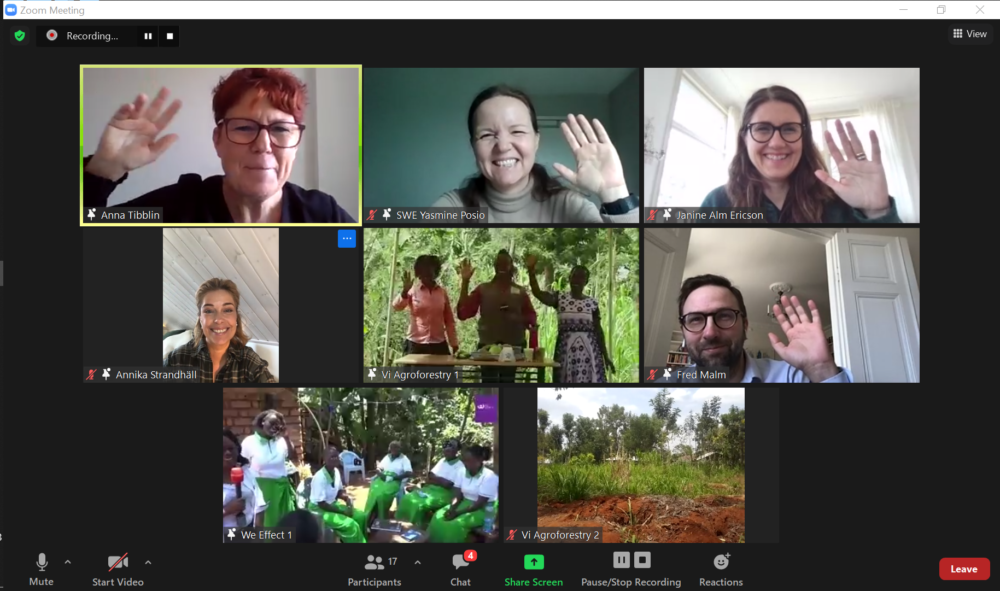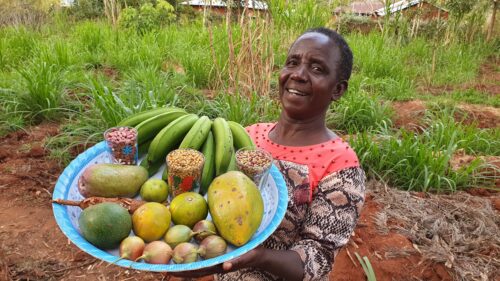Women's empowerment in focus at digital meeting between Swedish politicians and Kenyan farmers
Date
March 8, 2021
“As you can see, not all my land is cultivated,” says Consolata Chikombe, a small-scale farmer in Kitale, western Kenya, hitting the fields with her hand in front of the video camera.
On the other side of the world, a handful of Swedish politicians sit at their computer screens and listen attentively.
“When the community shut down during the corona pandemic, I could not hire extra help, but had to work alone in the fields. That’s why there was so little, “says the 66-year-old farmer.
In the lead-up to International Women’s Day, Vi Agroforestry and We Effect jointly arranged a digital visit to Kenya for Swedish Members of Parliament Annika Strandhäll (S), Yasmine Posio (V), Kerstin Lundgren (C) and Fredrik Malm (L), as well as State Secretary Janine Alm-Ericsson (Mp). The purpose of the visit was to give the politicians an opportunity to look around, ask questions, discuss and form their own idea of how the pandemic has affected female farmers in the world’s low-income countries.
“What do you do to preserve water or reduce water consumption?” wonders the Centre Party’s Kerstin Lundgren after Consolata has explained that the well has dried and that she has over a kilometre to go to get water.Women make up almost half of the agricultural workforce in low-income countries, but their ability to operate is often hampered by gender norms governing women’s access to land, finance and training. This makes women particularly vulnerable to poverty and hunger in times of crisis. According to UN Women for example, women are 27 % more likely than men to suffer from insecure access to food.
In Machakos, east of the capital Nairobi, Mary Mwikali Musau and her colleagues in the Kilalani Women in Coffee group describe how coffee is traditionally considered a male-only crop. At the same time, it is basically the only commercial crop that grows well in the area.
The Kilalani Women in Coffee are a group of women who farm and promote the participation of women in coffee farming within the Kilalani Famers Cooperative Society – who in turn are a part of the Machakos Cooperative Union (MCU). The group was set up to give female coffee farmers a voice in this cooperative union that supports local coffee cooperatives with access to industrial coffee mills, marketing and training.
The women in the group also have a joint savings initiative, which they all contribute to and benefit from, and which further strengthens their position. They have plans to start a chicken farm with some of the savings and have a joint fund for school fees for the village’s children.
“I bought a cow with my savings and paid the school fees for my grandchildren. My husband is happy because I help with the supply,” says Rael Ndunge.
During the digital visit, the Swedish politicians took the opportunity to ask many questions: How much of your harvest do you and your family consume and how much can you sell on the market?, asked Fredrik Malm. How does the corona pandemic affect you today?, asked Annika Strandhäll. Are your neighbours inspired by what you do?, asked Janine Alm-Ericsson. What are the benefits of working collectively?, wondered Yasmine Posio? What are your dreams?, asked Kerstin Lundgren.
The farmers Consolata Chikombe in Kitale and Mary Mwikali Musau and her group in Machakos have, thanks to their agriculture, done relatively well through the corona pandemic, they say. Although the markets have remained closed and income levels have fallen during the nearly year-long lockdown in Kenya, they have at least had the opportunity to eat the food they produce themselves; bananas, cassava, mango, passion fruit, honey, eggs and milk.
 “I’ve learned during the pandemic that it’s important to grow your own food, and so have people in the village. Because otherwise, when you can’t move freely, you can’t get any food,” concludes Consolata Chikombe in Kitale.
“I’ve learned during the pandemic that it’s important to grow your own food, and so have people in the village. Because otherwise, when you can’t move freely, you can’t get any food,” concludes Consolata Chikombe in Kitale.
Thanks to support and trainings from Vi Agroforestry, Consolata Chikombe shifted farming methods to agroforestry years ago and now grows a rich variety of foods for her family and fodder for her cows.